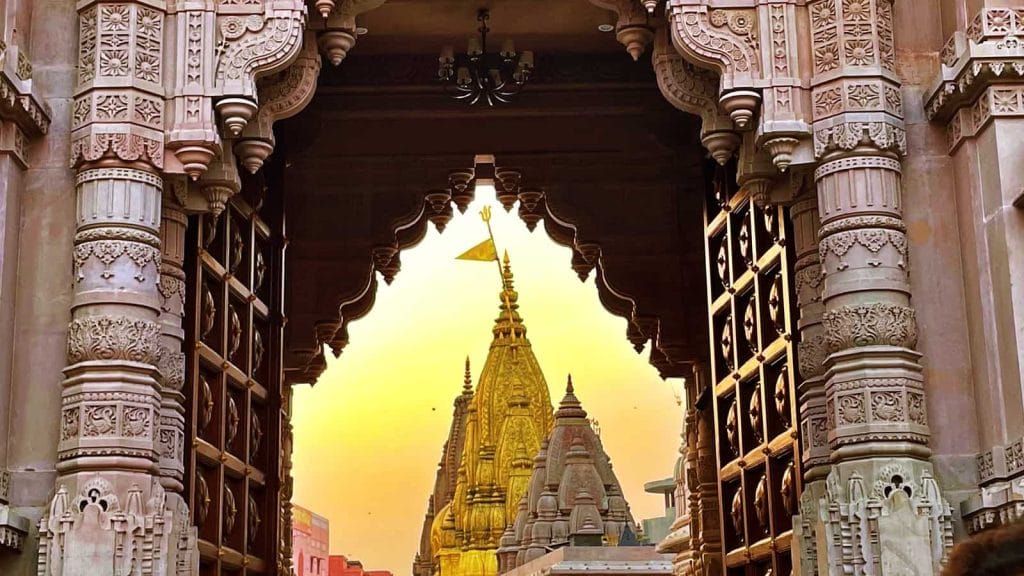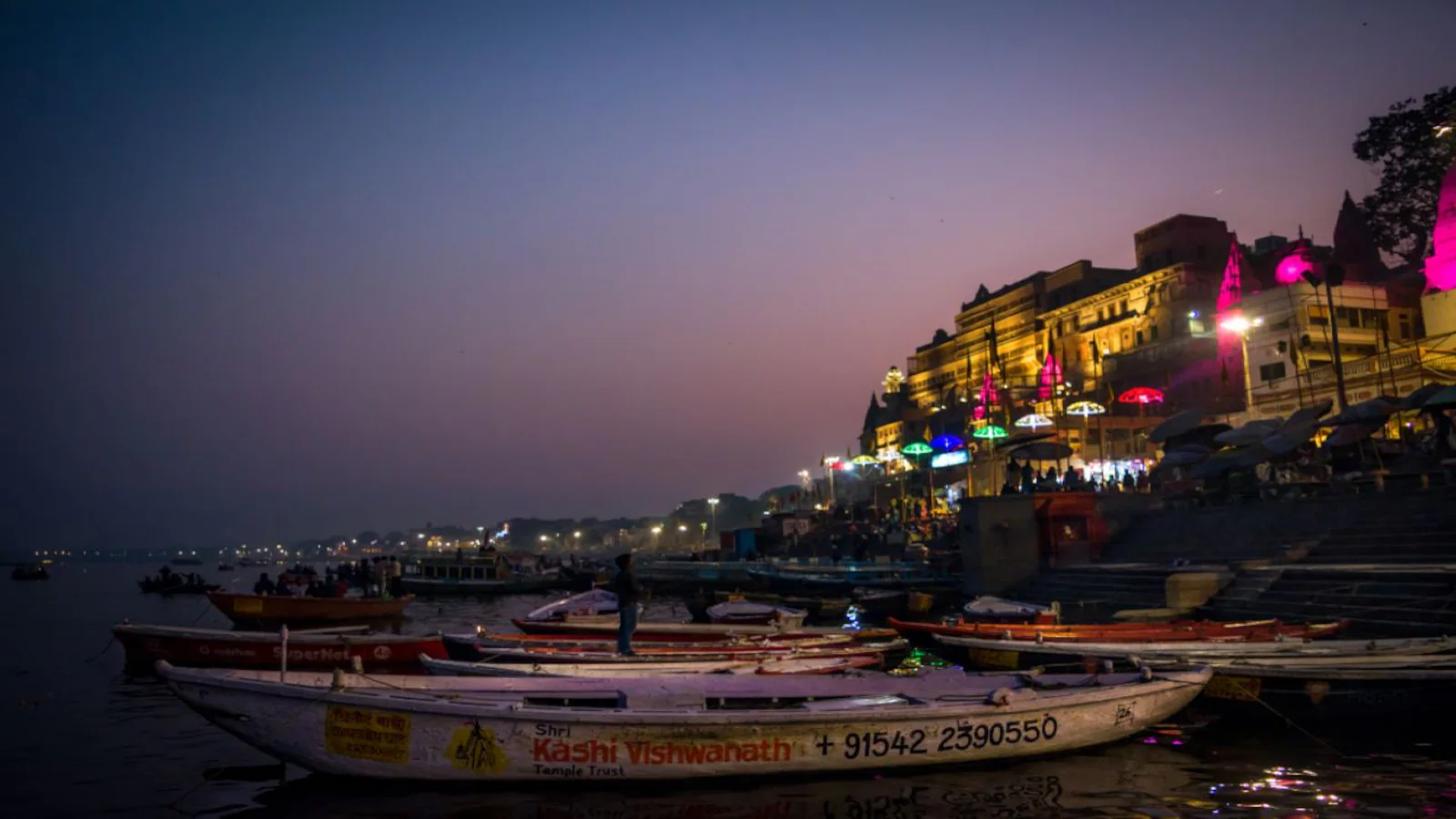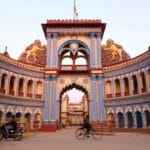Introduction: Why Kashi Vishwanath Temple Matters
Kashi Vishwanath Temple in Varanasi isn’t just another temple—it’s the beating heart of Hindu spirituality. Situated on the western bank of the holy Ganga, this temple dedicated to Lord Shiva attracts millions of devotees from India and abroad. Known as one of the twelve Jyotirlingas, it is believed that a visit here guarantees moksha (liberation).
For centuries, saints, philosophers, kings, and common pilgrims have walked the narrow lanes leading to this temple. Today, after the completion of the Kashi Vishwanath Corridor, the temple has become even more accessible while retaining its divine aura. Whether you’re planning a Kashi Darshan, exploring Varanasi temples, or embarking on a spiritual journey, this guide will take you through every detail you need to know.

Historical Significance of Kashi Vishwanath Temple
Legends and Mythological References
According to Hindu scriptures, Lord Shiva declared Kashi (Varanasi) as his eternal abode. It’s said that even when the world ends, Kashi remains untouched, making it the holiest city for Hindus. The temple is mentioned in the Skanda Purana, Kashi Khanda, which describes its spiritual glory.
Reconstruction Across Dynasties
The temple’s history is filled with invasions, destruction, and reconstructions:
- The original structure is believed to date back thousands of years.
- In 1194 CE, Qutb-ud-din Aibak’s forces demolished it.
- Raja Man Singh rebuilt it in the 16th century.
- Mughal Emperor Aurangzeb destroyed it again in 1669 and constructed the Gyanvapi Mosque on the site.
- In 1780, Ahilyabai Holkar of Indore built the present temple, which still stands today.
This resilience reflects the unwavering devotion of Hindus towards Lord Vishwanath.
Location and Accessibility
How to Reach Kashi Vishwanath Temple
The temple is located near the Dashashwamedh Ghat in Varanasi, Uttar Pradesh.
- By Air: The nearest airport is Lal Bahadur Shastri International Airport (VNS), about 25 km away.
- By Train: Varanasi Junction and Banaras Railway Station connect the city to major Indian cities.
- By Road: Well-connected highways make it accessible from Prayagraj, Ayodhya, Lucknow, and Bodhgaya.
- By Boat: Many pilgrims prefer arriving by boat along the Ganga for a spiritual experience.
Nearby Landmarks and Attractions
- Dashashwamedh Ghat
- Manikarnika Ghat (famous cremation site)
- Gyanvapi Mosque
- Vishwanath Gali (shopping street for religious items)
Architectural Brilliance of the Temple
The Golden Spire and Symbolism
The temple’s gold-plated spire and dome shine brightly under the sun. Maharaja Ranjit Singh of Punjab donated around 1 ton of gold for this, making it one of the most visually striking Varanasi temples.
Inner Sanctum and Sacred Shrines
The sanctum houses the Jyotirlinga, a dark stone Shivling, about 60 cm tall, set in a silver altar. The temple complex also features smaller shrines dedicated to Kalabhairav, Vishnu, and Goddess Annapurna.
Rituals and Worship Practices
Daily Puja Schedule
Devotees can participate in daily rituals:
- Mangala Aarti: 3 AM
- Bhog Aarti: 11:15 AM
- Sandhya Aarti: 7 PM
- Shringar Aarti: 9 PM
- Shayana Aarti: 10:30 PM
Entry to some aartis requires advance booking online via the official Kashi Vishwanath Temple website.
Special Festivals and Celebrations
- Maha Shivratri: Grand celebrations with processions.
- Shravan Month: Devotees offer holy Ganga water to Shiva.
- Diwali & Dev Diwali: The temple and ghats glow with millions of lamps.
Spiritual Importance in Hinduism
Connection with the Ganga River
Bathing in the Ganga at Varanasi before visiting the temple is believed to cleanse sins. The Ganga and Vishwanath together create a powerful spiritual circuit.
Kashi Darshan and the 12 Jyotirlingas
Pilgrimage to Kashi Vishwanath is considered incomplete without visiting other Varanasi temples like Annapurna Devi and Kalabhairav. It also forms part of the larger Jyotirlinga Yatra across India.
Kashi Vishwanath Corridor Project
Facilities for Pilgrims
Inaugurated in December 2021, the Kashi Vishwanath Corridor has transformed the temple experience. It connects the temple directly to the Ganga with wide pathways, waiting halls, and clean facilities.
Modern Developments in the Complex
The corridor includes:
- Pilgrim facilitation centers
- Security checkpoints
- Shops for Prasad and souvenirs
- Museum showcasing the temple’s heritage
Visiting Guidelines and Temple Etiquette
Dress Code and Security Rules
- Men: Traditional dhoti/kurta or simple attire
- Women: Saree or salwar suit preferred
- No mobile phones, leather items, or cameras allowed inside
- Foreigners may need to follow special entry protocols
Best Time to Visit
- Winter (October–March): Pleasant weather, ideal for sightseeing.
- Festivals: Maha Shivratri and Dev Diwali offer unforgettable experiences but can be crowded.
Travel Tips for Pilgrims and Tourists
Accommodation Options in Varanasi
- Budget lodges near Godowlia Chowk
- Mid-range hotels near Assi Ghat
- Luxury hotels like Taj Ganges for premium comfort
Food and Local Experiences
- Savor Banarasi Paan, kachori-sabzi, and lassi.
- Attend Ganga Aarti at Dashashwamedh Ghat.
- Explore silk saree shops in Vishwanath Gali.
Nearby Temples and Religious Sites
Annapurna Devi Mandir
Located next to the main temple, Annapurna Devi is considered the goddess of food and nourishment.
Sankat Mochan Hanuman Temple
Dedicated to Lord Hanuman, this temple is a must-visit for devotees seeking relief from troubles (sankat).
Other important temples include Durga Mandir and Tulsi Manas Mandir.
FAQs About Kashi Vishwanath Temple
Q1. Why is Kashi Vishwanath Temple so famous?
It’s one of the twelve Jyotirlingas and believed to grant liberation to devotees who worship here.
Q2. Can foreigners visit the temple?
Yes, but they must follow dress codes and security checks. Some areas may have restricted access.
Q3. What is the entry fee for Kashi Vishwanath Temple?
General darshan is free. However, special aartis require tickets, ranging from ₹300–₹1,500.
Q4. How much time is required for darshan?
During regular days, 1–2 hours. On festivals, it can take 4–5 hours.
Q5. Is online booking available for darshan?
Yes, through the official website shrikashivishwanath.org.
Q6. What are the temple’s visiting hours?
The temple is open from 3 AM to 11 PM daily.
Conclusion: Embracing the Spiritual Essence of Kashi
Kashi Vishwanath Temple isn’t just a structure—it’s the soul of Varanasi. Visiting it is a life-changing spiritual journey, where you feel Lord Shiva’s eternal presence. From rituals and aartis to the divine aura of the Ganga, every moment spent here is unforgettable.
Whether you’re on a Varanasi tour package, a pilgrimage with family, or an international visitor seeking spiritual depth, Kashi Vishwanath Temple offers something timeless.
About TripCosmos.co – Your Travel Partner for Kashi Darshan
At TripCosmos.co, we specialize in Varanasi temple tours, Kashi Darshan packages, and customized itineraries covering Varanasi, Prayagraj, Ayodhya, Bodhgaya, and more. From arranging temple entry and trusted guides to comfortable stays and transport, we ensure your journey is seamless and soulful.
🌐 Visit us at www.tripcosmos.co
📞 Call/WhatsApp: +91-9336116210





